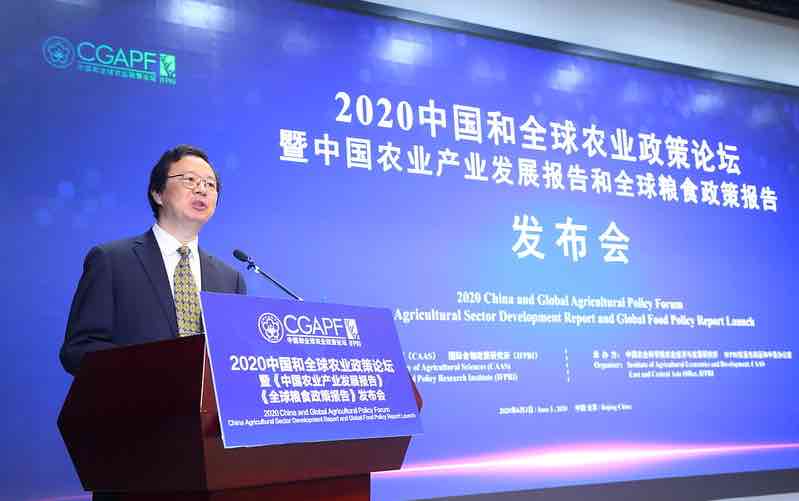The COVID-19 pandemic has created huge uncertainties for public health and economies around the world. How do we develop policies to face these evolving challenges? The 2020 China and Global Agricultural Policy Forum grappled with these questions. The event, co-organized by the Chinese Academy of Agricultural Sciences (CAAS) and IFPRI on June 3 in Beijing, launched the annual China Agricultural Sector Development Report (CASDR) and IFPRI flagship 2020 Global Food Policy Report (GFPR).
This year’s CASDR focuses on competitiveness, while the GFPR centers on inclusiveness. While those themes might seem contradictory, the two reports are actually variations on the same idea: We should build up the global food system to reach its potential not only in reaching social, economic and environmental goals, but also to face enduring risks and withstand emerging challenges.
Food system inclusiveness goes beyond equity
As IFPRI Director General Johan Swinnen has noted, the poor and vulnerable are too often excluded from the existing food system. A more inclusive food system that benefits everyone is not only a moral imperative, it is a matter of life and death, as poor people suffer disproportionately from crises such as the COVID-19 pandemic.
For China, 2020 marks the deadline for its goal to end poverty. But the COVID-19 crisis is having a major impact on China’s economy that creates challenges for reaching that goal. “We ensured people had enough food and agricultural products when COVID-19 threatens food security, but efforts still should be made to solve the deep-seated problems in agricultural development, especially protecting the poor and vulnerable,” said CAAS President Huajun Tang.
Rural incomes, especially those of the rural non-farm population, have been hit hard. According to data from China National Bureau of Statistics, China’s GDP shrank by 6.8% in the first three months in 2020. The urban population’s per capital disposable income fell 3.9%, and the rural population’s by 4.7%.
“As a retired old man in the city, I won’t be paid a penny less [in pension] due to COVID-19, but for farmers, their incomes hardly secured,” said Hongyu Zhang, Vice Dean of the China Institute for Rural Studies at Tsinghua University. “In 2019, the total number of migrant workers was 290 million, and the average monthly income of each migrant worker was 4,055 yuan ($573). If we only consider one month of impact on the income, the economic loss of 290 million migrant workers would be as high as 1.2 trillion yuan ($170 billion). In fact, the loss was much more than only one month’s incomes.” Building more inclusive food systems could help narrow the gap between urban and rural areas to achieve “common prosperity,” he added.
How can an inclusive food system support vulnerable groups including smallholder farmers, women, and unemployed youth? Former IFPRI Director General Shenggen Fan, now a Chair Professor at China Agricultural University, said this requires expanding downstream segments of the food value chain, creating employment opportunities or increased income for the marginalized in the long run. “An inclusive food system … would refer to resilience to mitigate shocks like climate change, regional conflicts, trade wars, or epidemic diseases.” Fan added.
Food system competitiveness and technological advancement
Using a methodology co-developed with IFPRI, CASDR 2020 provides data-based recommendations on raising competitiveness of China’s agri-food industry to address the impacts of the COVID-19 pandemic, fall armyworm, and other challenges. Technological progress has been the main driving force for the improvement of China’s agricultural total factor productivity (TFP), the report says. The annual growth rate of the environment and technology index (ETI), reflecting technological progress, is 2.81%. That growth in turn contributed about 78% to the growth of TFP. Yet in 2016, the proportion of investment in agricultural science and technology in China’s agricultural GDP was only 0.76%—significantly lower than the proportion of total investment in science and technology in China’s overall GDP, 2.12%.
“It is necessary to prioritize the development of agricultural science and technology, deepen the reform of food system. Through continuous technological progress, agricultural total factor productivity will grow, and competitiveness will be further improved,” said CAAS Vice President Xurong Mei. “Great efforts await to be taken in terms of biotechnology, equipment technology, information technology, and technology for reducing energy consumption,” Zhang added.
The entire food system is in need of technological innovation. “Ensuring food supplies is the bottom line, while development of the agricultural service industry is also a very important issue,” said Changyun Jiang, Deputy Director of the Institute of Industrial and Technical Economics at National Development and Reform Commission. “The end of the agri-food chain is the key. Technological advances should contribute to growing the agricultural service sector, that has increasingly become a significant driver for agricultural transformation.”
“Investment in agriculture as a whole mainly depends on private capital,” said Xiaohua Chen, Deputy Director of the Agriculture and Rural Affairs Committee of the 13th National Committee of the Chinese People’s Political Consultative Conference. “At least 80% of the fixed assets investment in the agriculture industry is on facilities, while not much is really invested in scientific research. Therefore, the government should take the lead to ensure investment in scientific research and the steady growth of this sector,” Chen said.
Longjiang Yuan, Director General of the Institute of Agricultural Economics and Development of CAAS, and IFPRI Senior Research Fellow Kevin Chen, Head of the IFPRI East and Central Asia Office, moderated the forum, the third such annual launch. IFPRI and CAAS share a longtime partnership, and the forum was held both on-site and broadcast online this year, reaching an audience of more than 4,000.
Donghe Li is a Communications Assistant with IFPRI’s East and Central Asia Office in Beijing.







